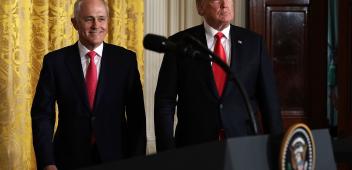Lesson in Asia crisis for unworkable Greek bailout solution
Lesson in Asia crisis for unworkable Greek bailout solution
Leon Berkelmans
Australian Financial Review
20 July 2015
Click here for the online text.

Executive Summary
In 2001 Stanley Fischer, now vice chairman of the Federal Reserve, gave a series of lectures that identified shortcomings with the International Monetary Fund approach to the Asian 1997-98 financial crisis - shortcomings which may have been repeated in the Greek crisis.
Having just finished a tumultuous seven years at the International Monetary Fund, Fischer gave a robust defence of the IMF's handling of the crises at the Lionel Robbins lectures at the London School of Economics.
However, he also opined "I do believe that the Indonesian program included too much conditionality that the government was reluctant to implement, and that accordingly some of the conditions in that program could with benefit have been omitted."
A couple of years later, in 2003, the IMF's Independent Evaluation Office published a report reviewing then recent crises. They also concluded that structural reforms, which were initially designed to enhance confidence, may have had exact opposite effect.
In particular, the report stated: "(T)he elaboration of such an extensive agenda, much of which did not seem critical for stabilisation, may have hurt confidence, once it became clear that the measures were not owned at the highest political level."
And so now we find ourselves in 2015. Greece has been presented with a reform program that has already been electorally defeated. Prime Minister Tsipras told lawmakers "I don't believe the measures will benefit the economy, but we are forced to adopt them." That's not ownership. That's complete and wholesale abandonment.
To again quote from the same 2003 IMF report "It would have been better to concentrate on macro-critical areas" in the Indonesian program. The reform agenda for Greece does not appear to pass that test. Remarkably, the seven-page statement following the recent euro-summit meeting identified ferry transportation as macro-critical.
Really? Ferry transportation? Will that fix the budget and stimulate demand? Meanwhile, the insistence in the same document that bakeries be reformed has come in for widespread ridicule. Bakeries appear set to become to the Greek crisis what the clove monopoly was to the Indonesian crisis - completely beside the point.
From the beginning, the Greek situation has been a complete fiasco. The scale of Greek incompetence and malfeasance that brought about the debt pile beggars belief. The Greeks have no defence for that charge. We've had years of meetings.
Emergency summits have been called to thrash out some threadbare compromise at midnight. The can has been kicked down the road so many times it no longer resembles a can. It's a pathetic, crumpled, ball of tin. It's so small now that the next attempt to kick will probably miss.
As long as the creditors refuse to learn the lessons of the Asian financial crisis, things will not improve. Make no mistake, Syriza has performed poorly.
Have things improved under their watch? Not even close. But they are a result of the crisis. Economists have a word they like to use for these situations: endogenous. Syriza is endogenous. If a country goes through a horrible depression, then its politics will start to become dysfunctional.
Greece needed a bailout. If the creditors did not help, then things would have been much worse. But that's not the right baseline to justify the creditors' demands. If your neighbour's house is burning, and you only save half the house so as to teach them a lesson about fire safety, would your defence be, "without me, they would have lost all of it"?
Greece needs debt relief. The debt, or more accurately the required path of primary surpluses, is not feasible. The IMF itself has said so. Academics Barry Eichengreen and Ugo Panizza wrote a paper 12 months ago on fiscal consolidations, and concluded that what is being asked of not just Greece, but also other European countries, is "exceptional".
The authors, after looking at historical data, found that a long string of large primary surpluses it is much more likely to be achieved when growth is high, a condition that does not apply to Greece, and is unlikely to for some time. They noted that New Zealand's example of debt reduction, from 1995 to 2010, is perhaps "the most encouraging one we have for the sustainability of eurozone debts".
But New Zealand has a floating exchange rate that helps cushion the blow of any fiscal adjustment. Greece does not have that.
It looks, however, like nothing has really changed. The creditors will attempt to squeeze more blood out of the Greek stone. Why should the economic outcome now be any different to what has happened over the last few years?
Greek politics may well take more unhelpful turns. We can certainly expect more emergency summits. There will be more last-minute, rushed, and completely inadequate compromises. What's the endgame? As Josh Barro, of The New York Times, recently tweeted, "It seems crazy to expect these people to share a currency for the next 100+ years".
Dr Leon Berkelmans is international economy program director at the Lowy Institute.



